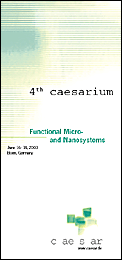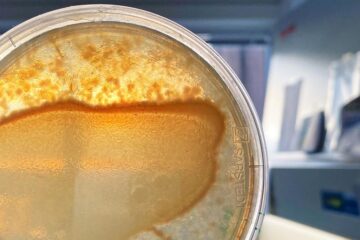4th caesarium – Functional Micro- and Nanosystems

The annual caesar symposium will be held in June 16-18, 2003 covering the field of Functional Nano- / Microsystems for Industrial Applications, which is presently one of the key research areas of caesar. The purpose of this symposium is to bring together world known experts to report about the state-of-the-art of this rapidly evolving discipline and to identify and open up new research directions for the future. Thin film technologies are an attractive approach to incorporate functional properties into micro- or nanosystems. The continuing development towards smaller structures is driven by the use of higher driving frequencies and thus smaller wavelengths, the growing integration of different functions, the higher degree of parallelism, and size requirements for the detection of bio-molecules. Hence this new technology opens up new possibilities in terms of high frequency wireless data transmission over long distances, sensors showing high spatial and time resolution and new devices to process biological, optical and electrical signals.
The 4th caesarium will be a platform to discuss the potential of Functional Micro- and Nanosystems with respect to applications in automotive, biochemical and information technology.
caesar
caesar-center of advanced european studies and research-is an international research center located in Bonn. The private, non-profit interdisciplinary research institute carries out cutting-edge technologies at the interface of information sciences and physics, chemistry, biology and medicine. The main goal of each project within caesar is to forge a synthesis between theoretical and experimental research as well as industrial applications.
Media Contact
Weitere Informationen:
http://www.caesar.deAlle Nachrichten aus der Kategorie: Veranstaltungsnachrichten
Neueste Beiträge

Das Mikrobiom verändert sich dynamisch und begünstigt wichtige Funktionen für den Wirt
Ein interdisziplinäres Forschungsteam des Kieler SFB 1182 untersucht am Beispiel von Fadenwürmern, welche Prozesse die Zusammensetzung des Mikrobioms in Wirtslebewesen steuern. Alle vielzelligen Lebewesen – von den einfachsten tierischen und…

Wasser im Boden – genaue Daten für Landwirtschaft und Klimaforschung
Die PTB präsentiert auf der Woche der Umwelt, wie sich die Bodenfeuchte mithilfe von Neutronenstrahlung messen lässt. Die Bodenfeuchte hat nicht nur Auswirkungen auf die Landwirtschaft, sondern ist als Teil…

Bioreaktor- und Kryotechnologien für bessere Wirkstofftests mit humanen Zellkulturen
Medizinische Wirkstoffforschung… Viele Neuentwicklungen von medizinischen Wirkstoffen scheitern, weil trotz erfolgreicher Labortests mit Zellkulturen starke Nebenwirkungen bei Probanden auftreten. Dies kann passieren, wenn zum Beispiel die verwendeten Zellen aus tierischem…





















